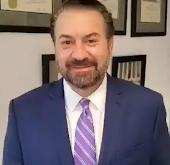UPDATE, 12/23: UPDATE: Brnovich Files Unrequested Reply To Supreme Court in Arizona Abortion Case
Supreme Court Justice Elena Kagan did not ask AZ AG Mark Brnovich to file a reply in his application for an order to allow Arizona's anti-abortion law to go into effect pending appeal, but reply he did. It is unlikely Kagan will consider the 21-page extra-argument filed last night, and it might get removed from the record.
Brnovich is asking the Supreme Court to permit the part of the law that would prohibit medical providers from performing an abortion if they know it is solely because of genetic abnormalities. District Court Judge Douglas Rayes blocked that portion and it is currently before the Ninth Circuit.
Supreme Court Rules do not permit a reply unless requested by the Justice in charge of deciding the stay application. Brnovich's extraneous reply re-argues all of the conditions to receiving a stay from the court, and even manages to crack an egg reference over Kagan's head:
"Even if Roe and Casey apply, the Reason Regulation (as the district court held) does not impose a ban on pre-viability abortion, and Respondents otherwise failed (by putting all of their eggs in the “ban” basket) to establish an undue burden, thereby resulting in rational basis review. The Reason Regulation satisfies strict scrutiny, let alone rational basis."
It is not clear when Justice Kagan will rule.
UPDATE, 12/21 at 4pm: UPDATE: Supreme Court Can't Grant AZ AG Brnovich's Request To Allow Only One Small Section of AZ Abortion Law To Go Into Effect Pending Appeal, Opponents Argue
Opponents explained today why the U.S. Supreme Court cannot grant Arizona's request for part of the state's new anti-abortion law to go into effect while an appeal is still pending. The ACLU and Center for Reproductive Rights filed their Response with Justice Elena Kagan, and argued that AZ AG Mark Brnovich is engaging in "rank speculation" and that "granting a stay of one provision would only exacerbate the vagueness problems that plague the law, while imposing severe burdens on Plaintiffs, their patients, and their members’ patients."
A large part of their argument is based upon the AG's "disfavored" tack of asking the Supreme Court for a stay while the Court of Appeals is still hearing the appeal.
"Defendants fall far short. First, and dispositively, they have not shown irreparable harm. Second, Defendants’ prediction of potential circuit splits relies on multiple layers of speculation about what the Ninth Circuit and several other circuit courts will do. Third, Defendants fail to provide any reason to disturb the district court’s well-reasoned preliminary injunction maintaining the status quo, resting on multiple grounds and the Reason Scheme as a whole."
There is no indication as to when Justice Kagan (as the Justice assigned to consider such motions from the 9th Circuit) will issue her ruling.
UPDATE, 12/16 at 11am: Supreme Court Justice Elena Kagan has asked the parties challenging Arizona's ban on abortions sought solely because of a genetic abnormality to file a response to Arizona's application to let the law go into effect while the court battle continues. The plaintiffs are being represented by the American Civil Liberties Union and the Center for Reproductive Rights - Kagan asked for the response(s) by next Tuesday, Dec. 21. (Kagan is the Justice assigned emergency actions from the 9th Circuit.)
Original Article, 12/14, 4:45pm: BREAKING: Brnovich Goes To U.S. Supreme Court On Arizona's New Abortion Law (READ Motion)
Arizona Attorney General Mark Brnovich is asking the U.S. Supreme Court to allow Arizona's new law prohibiting abortions due to genetic abnormalities to go into effect while lower courts are considering it. The request had been denied by Arizona's District Court Judge Douglas Rayes and the 9th Circuit.
Arizona's law - passed earlier this year and signed into law by Governor Doug Ducey - also contained a so-called "personhood provision" giving rights and privileges to the fetus; that provision was not blocked by the courts.
However, Judge Rayes did block the outright ban on abortions which could be proven to be solely due to genetic abnormalities.
Brnovich filed this emergency application with the U.S. Supreme Court this afternoon, on the basis that it is likely that at least four Supreme Court Justices would vote to review the issues surrounding Arizona's SB1457 ban, and there might be a vote to reverse the 9th Circuit's November 26 denial of a stay. The Supreme Court recently heard the Mississippi abortion ban, and on Friday declined to stay Texas's unusual abortion ban law.
This article was reported by AZ Law founder Paul Weich. Paul is currently running for a seat in Arizona's House of Representatives.
"AZ Law" includes articles, commentaries and updates about opinions from the Arizona Supreme Court, U.S. Supreme Court, as well as trial and appellate courts, etc. AZ Law is founded by Phoenix attorney Paul Weich, and joins Arizona's Politics on the internet.




No comments:
Post a Comment